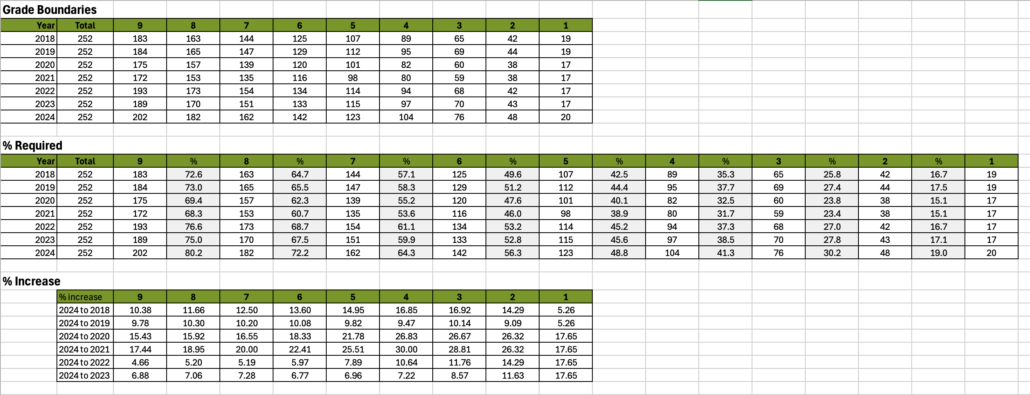Over the coming days, we’ll be adding a range of resources and information to support the exam analysis of the 2024 AQA GCSE Geography results.
Data
The graphic below shows the grade boundaries for the AQA GCSE Geography exams between 2018 and 2024, along with the % required to access each grade and the % change between 2024 and previous years. Click here to download v1.0 of this data in Excel.
2024 AQA GCSE Geography exam analysis data
Exam Report
Key Highlights:
- Overall Performance:
- The majority of students performed better than in previous years, with most questions being accessible to all ability levels. The full range of marks was used effectively, with higher mean marks noted across the cohort.
- Multiple-choice and low-tariff questions were generally answered well, particularly in graphical interpretation, map reading, and mathematical abilities.
- Strengths:
- Students demonstrated strong knowledge of climate change, tropical storms, and physical geography topics such as food webs, tropical rainforests, and plant adaptations in extreme environments.
- Many introduced relevant case study material when prompted, especially in questions that required in-depth knowledge.
- Performance on 6- and 9-mark questions improved, with many students managing to deconstruct these questions effectively, addressing the evaluative aspects.
- Challenges:
- Map Skills: Students often struggled with basic map skills, including describing relief and drainage.
- Geographical Vocabulary: Some students misunderstood key geographical terms such as biodiversity, selective logging, and managed retreat.
- Physical Processes: There was confusion about physical processes like erosion and landform recognition, particularly with coastal, river, and glacial landforms.
- Command Words: Students sometimes misinterpreted command words like “explain” or “compare,” which affected their ability to structure answers appropriately.
- Graph Completion: Many students failed to complete graph-related tasks, missing straightforward questions.
- Recommendations for Improvement:
- A focus on enhancing map skills and understanding of physical geography processes is recommended.
- Teachers should emphasize the correct use of geographical terminology and the interpretation of key command words.
- Greater attention to developing comprehensive answers for higher-mark questions would benefit students, particularly in the use of case studies and application of knowledge to exam resources.
The report stresses the importance of holistic preparation, focusing on applying knowledge rather than rote memorisation. It also suggests that some students would benefit from improved exam technique, particularly in terms of timing and structure.


